In his media address from the bubble on Monday, Toronto Maple Leafs GM Kyle Dubas discussed his expectations for the playoffs, the organization’s plans for prospect development if the junior and/or AHL seasons don’t proceed in 2020-21, the rumours of Egor Korshkov heading to the KHL, and the burgeoning leadership qualities of Mitch Marner (nominated for the King Clancy) and Auston Matthews (nominated for the Lady Byng).
What are your first impressions of the setup in the bubble? What do you think will be most important for the guys in order to handle it and be in the best position to perform on the ice?
Dubas: I think the setup here is pretty great, actually. We’ve only been here for about 12 hours and a lot of that was spent in the Ford Performance Center, but in terms of the way it all operates, it’s very different than what we are used to, but I think the NHL and the staff here — and the MLSE staff — have done a great job of getting this all set up. It has gone pretty well so far.
It is just so different and so regimented in terms of timing and where you have to be and when you have to be there. There is not the latitude for players or coaches to go to the rink early or stay a little bit later. That will be the biggest adjustment. Just rolling with it when things don’t go as planned or the conditions aren’t what we are used to is going to be the key for all of us.
Coaches aren’t able to hang around as long as they might have. Are there other things that you’ll have to adjust to? You’ll be walking to the rink and taking a bus to the practice facility. What are some of the logistics that you know are coming?
Dubas: There is also the testing component to it, too. You’ve got your set testing time — the coronavirus testing that you have to execute — and then just the actual health checks that are inside. There is a daily questionnaire and symptom check with these very high-tech machines. Going back five months ago, I wouldn’t think we’d be standing in front of this computerized intelligence machine that would tell you your temperature and give you the green light to proceed with your day. It is much different.
If you had told me five months ago that this is where we would be at, I’d never believe it. We are just excited to have a chance to be back and playing.
Based on what you saw in Phase 3, what gives you confidence that this group is ready to take the next step?
Dubas: I think if jump back from your question into Phase 2, though it was a voluntary phase, the effort that the players put into it and their focus on their on and off ice even during that phase — and their work away from the rink, with how careful they were being, and how they were holding each other accountable — it was a really strong sign for me about the growth we are going through as a group.
Obviously, the objective stuff — the talent level of the group — has never been in question. It has been the maturing and mindset of the group that we know we have to take some strides in. So far, through Phase 2 and Phase 3, I have certainly been very happy in what I have seen in terms of using these last four-plus months to really work on those things as a group.
A lot of that has been player-driven. Sheldon and I have spent a lot of time talking to the players about it and having very open discussions about where we are at, but in the end, they have been the ones that have been executing it. In these last two phases, that has been the most positive that I have seen.
I don’t know how that plays out in the short term. I think because this is just such a strange set of circumstances, none of us really know how it is going to play out once we start tomorrow and get into the series against Columbus on Sunday, but in the long run with where we want to go as a franchise, I am optimistic it is going to help us now, but I am even more optimistic about how it helps us in the long run in terms of where we want to go as an organization.
With the report that Egor Korshkov is heading to the KHL on loan, can you provide an update on where you guys are at with prospect development? How concerned are you with prospect development if there aren’t junior or AHL seasons next year?
Dubas: The way that we have approached it in terms of where players are going to play next year is that we have had to sort of get outside of our usual plan for them. For any of our guys, at this point in the year, they would be about a month before heading into camp. The players based in Europe would be heading into their training camps now. The tact that we have taken during the circumstances impacting the world everywhere is that we have to be a little bit more agile in our thinking in terms of what we want with our prospects.
None of these things are official yet, but some of these players have relationships in Europe and have played in different places in Europe. If they are able to and those places are safe with regards to the virus, it is a great opportunity to see those players get some game action and some time. If everything goes according to plan here — and it seems like it is going to based on the job the league has done — and our training camp for next season starts up in mid-November as planned, we will be able to bring most of those players back, or we can decide to leave them there for the full season to continue to develop.
Those seasons should be wrapping up about halfway through our NHL season, and then we can bring them over. We have tried to not be confined to one line of thinking on it and stay very open to any ideas that come up, and do what is best for each individual player — not just take a general, cookie-cutter approach to it.
Mitch Marner said the team is hungry to prove itself when the season gets going. What, in your mind, does the team have to prove?
Dubas: I think we have a lot to prove. I don’t think that anyone questions the talent of the group. I firmly believe that we need to continue to take steps with our defensive play.
Number one is our mindset becoming an elite team that really values how we are performing defensively. Why I say it is a mindset thing and not a personnel or skill set thing is that we have shown in various games and stretches that we can be a good defensive team. We need to be there consistently and all the time. We need to be in the top-10 in the league in order to really maximize our whole group.
The players have lived the season — the ups and downs of it — and experienced it. I think they realize what they have to do to really see their talent reach its potential in terms of winning and losing and making long runs in the playoffs.
I think it is great that the players talk about it. The players know the doubts that are on them, whether it is from media or other teams. They know what they have to prove. Them acknowledging it and talking about it is a good sign. They are not negative about it. They are not upset people say it about them. They know they have to prove it. That is what we will get a chance to do in the coming weeks and years.
How much do you anticipate taking advantage of this unique situation and taking in some other games live and maybe even doing some scouting?
Dubas: It will be great. There will be 12 NHL teams playing at very high stakes happening essentially 200 steps from where you are living for the next number of months. If we don’t have a practice or set team function, most of us will be there watching.
Sheldon is certainly focused on the day-to-day and that is a strong focus of mine, but also, in the long term, I am spending a lot of my time thinking about where our team will be going and looking at various free agents that might be available that will be here playing. This is a great chance to watch a lot of games of those players and really deeply study them before we head into what we hope will be a rapid succession of events from Stanley Cup Finals to draft and free agency and then offseason and training camp. It should only be, we hope, a month and a half. We have a lot to get done in that time.
I think this is just an awesome opportunity. We are in the same hotel and the same areas as a lot of these other teams. You can learn a lot about the teams and their players just by watching and observing the way that they are off the ice and on. I think this is a great opportunity for us. Everybody who is here loves hockey a lot, so I assume everyone will be watching a lot of hockey and enjoying that.
This was the first year for Auston Matthews and Mitch Marner wearing a letter. Both wanted to take a step in the leadership department. What have you noticed out of them and have they taken a step?
Dubas: They had two different years. Mitch’s was derailed by the ankle sprain that he had early in November. He missed time and when he came back, Sheldon was now coaching the team. Despite that, Mitch had an excellent year.
What I have seen from Mitch — especially in the last number of months since the lockdown started — is a great ability for him to take more and more ownership of his career and really start to show… He’s always got that great gregarious and infectious way about him and brings great energy to the rink, and now you are starting to see that go from being a boyish energy and enthusiasm to really mature.
He is still the same in terms of the spirit that he brings to the rink every day, but now you are starting to see — he is at the end of his fourth year in the league — a greater sense of urgency in the fact that he is realizing this is a very good team and if we are going to go from being very good to great, he is going to have to be one of the drivers of it. He has been excellent, especially in this last stretch.
With Auston, as everyone saw during the year, he was one of the two players that played every game for us during the season of 70 games. The way he prepares, his focus, and how he has translated that into the on-ice and a dominating year in terms of goal scoring, and really driving the team… Really around late December and end of January, he stepped up and found a way through.
Both are still very young players in the league — both are going into the end of their fourth season now — and are just entering their prime. For us, they are very different in terms of how they are as people, as I think everyone knows who observes them, but they are equally important to us reaching our potential. The way that they drive this and learn from our veteran players and continue to take more and more of a leadership role, as they go from being the young guys to having to mentor young players coming in — whether it’s Timothy Liljegren, Rasmus Sandin, Nick Robertson, etc — it’s been exciting to see them take those steps in the last couple of years.



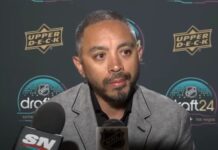


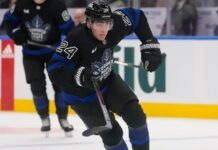
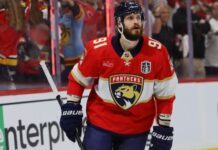
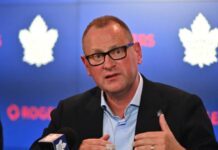
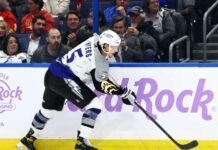


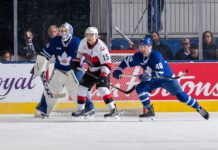
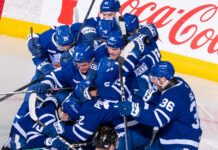

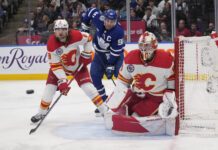

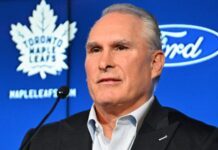
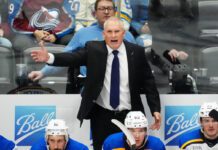


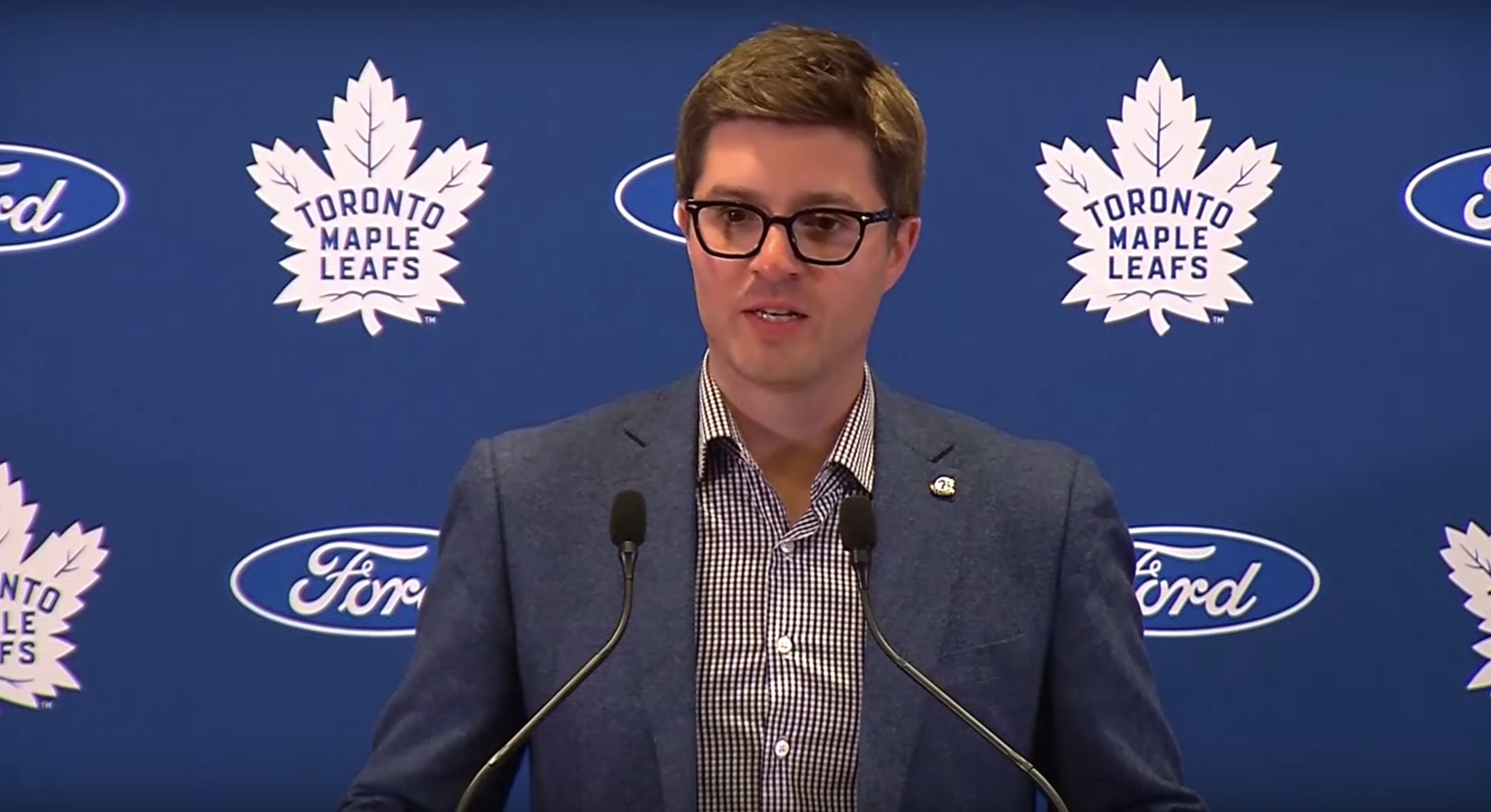
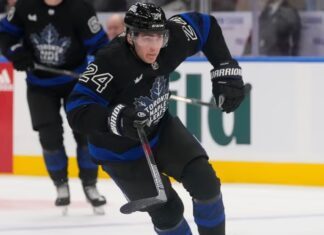







![New Leaf Anthony Stolarz on the opportunity in Toronto: “In Florida, I knew my role as a backup… Now, [Joseph Woll] and I are competing for starts… As a goalie, that’s all you can ask for” Anthony Stolarz, Stanley Cup win, now Maple Leaf](https://mapleleafshotstove.com/wp-content/uploads/2024/07/anthony-stolarz-sc-100x70.jpg)
